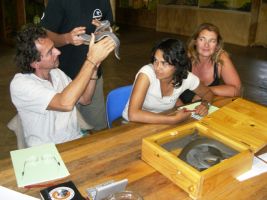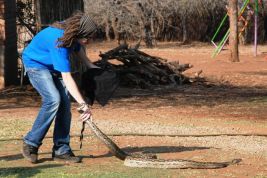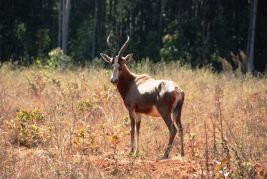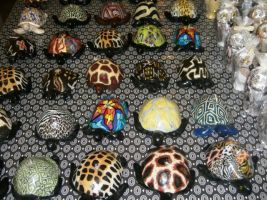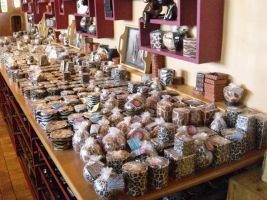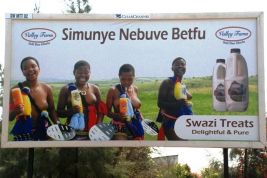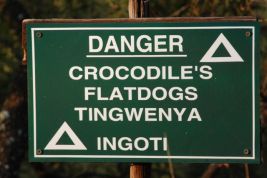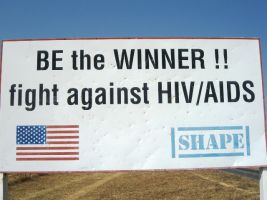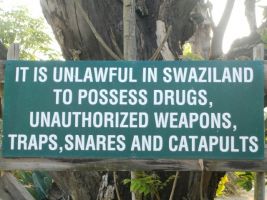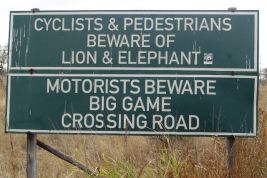
 Italia
Italia France
France Spain
Spain Morocco
Morocco Mauritania
Mauritania Senegal
Senegal Mali
Mali Burkina
Burkina Ghana
Ghana Togo
Togo Benin
Benin Nigeria
Nigeria Cameroon
Cameroon Gabon
Gabon Sao Tomè
Sao Tomè Gabon 2
Gabon 2 Congo
Congo Congo DCR
Congo DCR Angola
Angola Namibia
Namibia Sud Africa
Sud Africa Namibia 2
Namibia 2 Botswana
Botswana Zimbabwe
Zimbabwe Botswana 2
Botswana 2 Sud africa 2
Sud africa 2 Swaziland
Swaziland Mozambico
Mozambico Malawi
Malawi Tanzania
Tanzania Rwanda
Rwanda Uganda
Uganda Kenya
Kenya Etiopia
Etiopia Sudan
Sudan Egitto
Egitto Libia
Libia Tunisia
Tunisia Malta
Malta
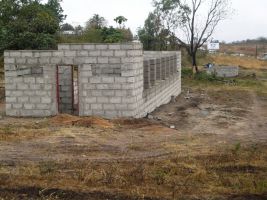
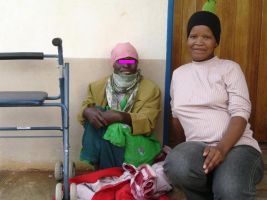
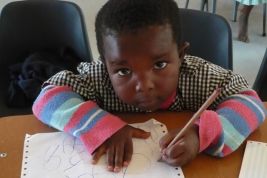
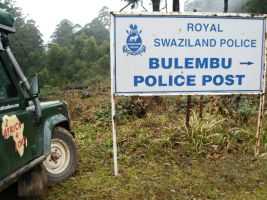
A Small Land – 18 Aug 2008
We enter through a small frontier: Bulembu.
We go through the formalities unbelievably quickly. We pay 50-rand for road tax (4,5-euro, same in pounds now!). We don’t use the Carnet de Passage because Swaziland is still a part of the SADC.
The local currency is Emalangeni (E) that is equivalent to the South-African Rand and it is accepted as the same, even by the banks.
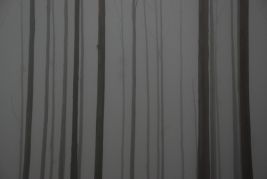
The last thirty kilometres in South Africa and the muddy track that we are driving down makes us feel like “we have left”.
The steep mountain roads, the fog, showering rain. Everything is slippery and wet. Have we seen the last of South African’s lovely roads?
The scenery is ghostly.
We really don’t want to sleep in the tents in the cold fog.
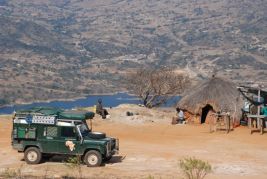
Piggs Peak – 17 Aug 2008
Last night we slept in a bed at Piggs Peak.
A bed and breakfast, in this mining city that was born towards the end of the 1800’s thanks to a gold mine that was exhausted fifty years ago. Slowly, as with the mine, the city has become depopulated.
Thankfully, the weather has changed.
We move towards the capital.
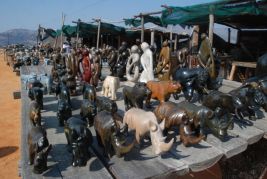
Along the road, we come across many artisan markets. The soft rock called “soapwort” is extracted from around here and the objects are sold at good prices. Nearly five times cheaper than in South Africa.
We buy a few things for the solidarity stalls that Elfo will organize when we return home.
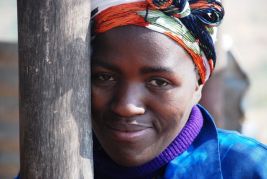
Mbabane – 19 Aug 2008
Very strange this capital without an airport. As soon as we arrive, we go to the Mozambique consulate where for 85-rand (8 euro/pounds) in about an hour they give us the tourist entry visa that is valid for 30 days.
GPS S26°20,359’E31°09,016’
Very quickly!!! And we were pleasantly surprised. At the Mozambique embassy of Nelspruit in South Africa, they had asked us for 545-Rand (50 euro/pounds) for the same visa.
We by and send some postcards,
We camp in the renewed Grifters Backpackers that we highly recommend.
GPS S26°19,004’E31°07,730’
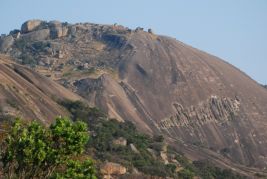
Mount Sibebe – 20 Aug 2008
This colossal mount of granite is supposedly the biggest and oldest in the world.
Next on the list is the Uluru (Ayers Rock) in Australia. It is 3 billion years old and is 1488metres high.
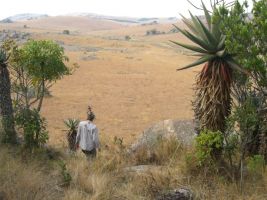
We decide to change our schedule and take an excursion to the top. We pay for the protected car park
GPS S26°14,00’E31°11,00’
The permit to climb it is 25E a head (about 2 euro/pounds each) and we start to climb the 700metres that separate us from the summit. The excursion amongst exotic plants and coloured granite lasts about 4 hours.
Beautiful.
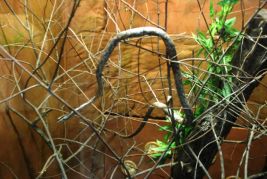
Nisela – 22 Aug 2008
Every Friday, in the private reserve of Nisela in the Southeast of Swaziland, there are courses in recognition, first aid and snake handling. It is quite unusual and we decide to go along to see.
The nervous and lethal black Mamba, the brave Puff Adder; the small Vine Snake (pictured) whose venom has no anecdote. An exciting and interesting experience.
Devon and Johnny who are very knowledgeable and passionate about this subject run the course.
Ezulwini Valley – 24 Aug 2008
In the 50km that separate Manzini and the capital Mbabane, there is the Paradise Valley, the heart of the monarchy and the area most frequented by tourists.
There is a small National museum in front of the Mausoleum of the old beloved King Sobhuza II.
Not far from there, is the residence of the present King Mswati III that cannot be visited; he is highly criticized and very careless when it comes to the needs of his people.
There are huge artisan markets all over the place where the locals earn enough to eat for a week with just one sale.
We stop in the Mlilwane reserve along the road of the “happy valley”. It does not have a great variety of animals but is located on a pleasant hill with red soil and lovely views. This is the first protected area of the state, established in the 50’s by the English Ted Reilly. We encounter crocodiles and for the first time an “ugly” antelope called a Blesbok.
The candles of Malkerns Valley.
There are some truly BEAUTIFUL candles!
In this Swazi Candle factory, they make wax animals and candles of all different shapes and sizes. Traditional and elaborate African colours and painting. It is a real shame that we cannot buy them in big quantities as our journey is still long and we’ll be crossing many hot places.
Still, we can’t resist taking a small amount back to sell on the stalls of the ELFO solidarity.
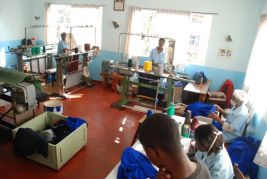
Mission in Mbabane – 25 Aug 2008
We learn of some Italian missionaries in Mbabane and decide to turn back and visit them. The mission has been here since 1914. As well as a primary school and a nursery, they are currently running a free hostel for girls that work a knitwear and needlework laboratory packing school uniforms.
Throughout the country, they have many projects. A most important one is a school on the south border that gives the opportunity of education to the small group of inhabitants in the isolated agricultural zones.
We stay a few days to help out; a constant toing and froing, poor people asking for help; for food and money.
It is not easy living like this always working for the basic needs of this huge mass of poor people. Amongst them, the unforgettable, old and toothless but cheerful Malinga, even though she has nothing, she takes care of a baby whose mother hanged herself and whose father died of AIDS.
We give help to a little girl in difficulty (details in solidarity).
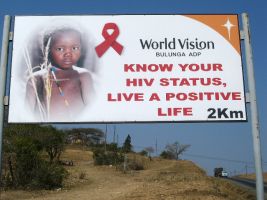
HIV
The problem of HIV is alarming. The official data shows HIV positives at 39%. That is two in five people! There are many different reasons - the history of emigration to the mines of South Africa looking for work and the promiscuous behaviour of both those away and at home. Polygamy, allowing men to have many wives, with consequent courting that does not always lead to marriage. A certain “tendency to tradition” of myths, incremented by the king, of… let’s say fertility. The present monarch Mswati III has 12 wives and with each one numerous children. His father, the king before him, had 100 wives and over 600 children.
These days, there is resentment and criticism against the king from those who are HIV positive; they accuse him of squandering state money instead of trying to cure those affected by AIDS. Some of his wives have in fact just come back from Dubai, where they have allegedly been shopping. The cost... a whopping 3-million-euro/pounds (!!!). In a country where the average wage is 20 euro/pounds a month…
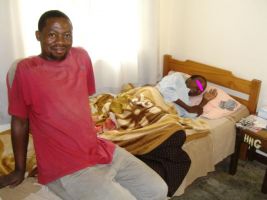
Hope House – 26 Aug 2008
A place where you can die with dignity.
A sentiment shared by Mother Teresa of Calcutta, furthermore, in this place run by Indian nuns, this is not just a sentiment. They have created for the many terminally ill - and not just for those suffering from TBC and AIDS – something more than just accommodation. There are those who may gradually recover and will go home and there are those who are dying and have their family around them. An intense experience. We decide to pay for the stay for a patient for a year (details in solidarity).
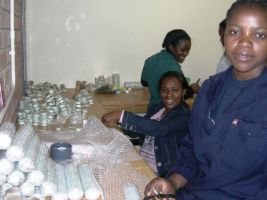
Swazi Secrets
This cosmetic products factory offers work to many women. It uses Marula fruit (also used for the famous liquor similar to whiskey cream) which is cold pressed, the precious Marula oil from the soft kernels is used for many different skin care products. This project gives work to the women of the region, who collect the Marula fruit.
We buy some soaps for the solidarity stalls of Elfo.
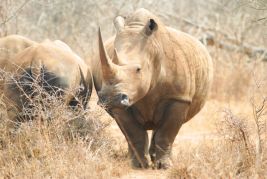
Hlane Royal NP – 27 Aug 2008
A small park full of surprises!
Within a few minutes we come across six white rhinos.
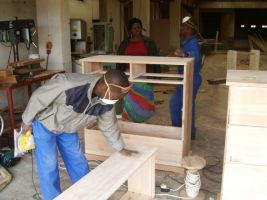
A Neapolitan lad!
Definitely an unusual person Angelo Ciccone.
At 78, he has been a missionary here for 51 years. However, he defines himself primarily as a Neapolitan.
He has created a proper village of hope for the poor and handicapped in this community of San Giuseppe. Two thousand people - students and workers - populate this large mission. There are schools of different levels and schools for the blind. There are also artisan laboratories where those disabled, whether mentally or physically, are taught a skill. There is a bakers store and a well-equipped optic lab, which is also used by the locals. There is an education project for the mentally disabled, who are taught chicken and pig farming, so that they can be self-sufficient.
During his life, he has witnessed many things and has made some unbelievable efforts forging great friendships (Carrà, Sordi, Arbore). He has sustained and been godfather to many high-risk communities of lepers isolated in the forest. He's an incredible and unique character, who himself is now on crutches - a result of a recent car accident whilst returning from Mozambique, following a meeting with the Italian embassy for a solidarity project. “I who have been looking after the disabled throughout my life, have now, joined them,” he tells us with all the irony of someone still young at heart. We decide to leave an Eflo token for one of his new projects (details in solidarity)
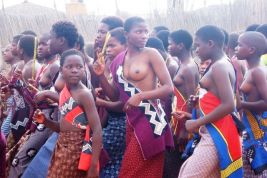
Reed Dance
Every year, this year on 1 September, over a few days, thousands of young women gather to pay homage to the queen mother. They dance in short traditional dresses in front of the court, they also carry cut reeds, which they use to rebuild the fence of the queen’s house. The king on this occasion can chose a future wife, the girls arrive from all over the country and must not have had any children, last year there were apparently 50,000! We ask some girls if they hope to be picked, but they all say that usually, everyone knows beforehand the chosen one. The women who consider it a great moment of happiness and fun take this traditional ceremony to heart; however, being the wife of the king doesn't seem all it’s cracked up to be, seeing that quite a few of them, despite the tight security, have managed to escape. Tourists can watch the dances by paying the king for permission.
We decide we cannot stay here for another week to see this, but mainly because, we do not want to support a monarchy that we don’t particularly like.
Signs, beer and curiosities
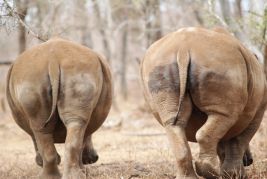
Our Impressions
The people here have never seen a civil war or a war for independence; they are calm and sociable. “They have never dirtied their hands with the blood of their brothers” don Angelo told us. They are good people but often poor and desperate. Many turn to stealing.
There are no police roadblocks and the police are considerate. The main roads are in tip-top condition.
It is a kingdom, with a monarchy that has absolute power, a strange political reality for our times. The previous king, apparently, was very smart, he was very capable and he did much for the independence of his country and for his people. His son, the current king, doesn’t seem to have the same abilities and intentions. His behaviour is not dissimilar to that of the presidents that we have come across in other states, he thinks of his own well-being squandering the money of the state, indifferent towards the problems of his nation. In a recent rally, to protest against the extravagant expenditure for his 40th birthday party, some women, exposed their buttocks, the subsequent photographs that appeared in the newspapers were accompanied by an article ironically titled “This gift, is from us”….
The women are extremely active in criticizing the social situation.
More so and much better than the men.
In support of these feisty brave women, we offer this nice pair of “derrière” as our tribute to the monarchy.
